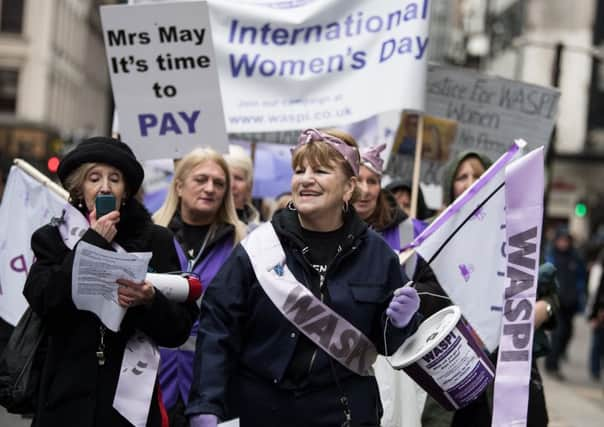Women in Scotland join forces to defend ‘threatened’ rights


Debate about pensions, gender equality, menopause, the decriminalisation of prostitution, period poverty, workplace pregnancy dismissals and surrogacy has prompted new “kitchen table” groups – mostly unconnected to political parties, trade unions or the third sector – to spring up.
Tomorrow one of those groups – Dundee’s Feisty Women – is expected to reveal the next step in its campaign against economic injustice for women over the age of 60.
Advertisement
Hide AdAdvertisement
Hide AdChair and co-founder Ann Porter believes that the emergence of so many new women’s groups is “thrilling”.
“A whole movement is definitely under way across Scotland and we are part of it. We started as a pensions campaigning group but we have realised there are many more issues around equality that need to be tackled.
“Sex discrimination is still rife. Inequalities are stark, and we need to make sure this discrimination is called what it is so we can tackle its.
“We believe the voice of older women is absent from national debates about discrimination and inequality. After a lifetime of sex discrimination, and now age discrimination, we want to apply our hard-won knowledge to economic and social inequality. Women have huge political and economic power and it’s really time the politicians cottoned on to that. ”
Julie Bindel, one of the UK’s foremost feminist campaigners, said she believed there was a “new sense of urgency” about women’s rights across the UK, prompting “more women to speak up, no matter the cost to them.”
She added: “When women’s rights are under threat that is when you see women at a grassroots level start to make their voices heard.”
For Susan Sinclair, the mum behind Scottish Women, the trigger to act was the Scottish Government’s proposed changes to the Gender Recognition Act, and a belief that national organisations were not properly representing women.
“Ideally none of us should be needing to do this as it should be getting done by the organisations who receive government funding to uphold women’s rights and the public authorities whose duties demand it. But women are being required to stand and fight for our own rights.
Advertisement
Hide AdAdvertisement
Hide Ad“I’ve been contacted by hundreds of women and I’ve been lucky enough to witness this growing passion in others who then went on to form their own groups.”
Three policy analysts, Lucy Hunter Blackburn, Dr Kath Murray and Lisa Mackenzie have formed a collective, MurrayBlackburnMackenzie, to scrutinise the impact of new laws on women’s rights.
Hunter Blackburn said: “Women who had assumed that legislation, systems and structures now existed to protected their interests have discovered this is not the case. We are coming together to work unpaid because we are worried. The legitimacy of existing well-funded structures speaking for women is now in the frame: we need those organisations to respond positively to what is happening.”
According to Sarah Pedersen, professor of communication and media at Robert Gordon University, social media helps women to campaign more effectively.
She said: “Since the 19th century, women have been involved in politics. Many of these women have previously found a home with the main parties or unions. Women are finding their concerns are no longer reflected in the agendas of these parties – if they ever were.”
Women and Girls in Scotland is another collective of working-class women who research legislation, conduct surveys and campaign to protect single-sex spaces for women, as does a new group, ForWomen.Scot, which was recently invited to the Scottish Parliament to give evidence on the Census Bill.
Pedersen cites Mumsnet as a prime example of a social media meeting place for women – with users saying they “came for the babies but stayed for the feminism”.
“Mumsnet has become ‘notorious’ or ‘celebrated’ for allowing the discussion of gender-critical feminist ideas on its feminism and women’s rights boards.” she said.
Advertisement
Hide AdAdvertisement
Hide Ad“It makes good business sense for Mumsnet to offer a place for gender-critical feminist discussion. But it also demonstrates that women will find places to discuss issues that impact them and their children.”